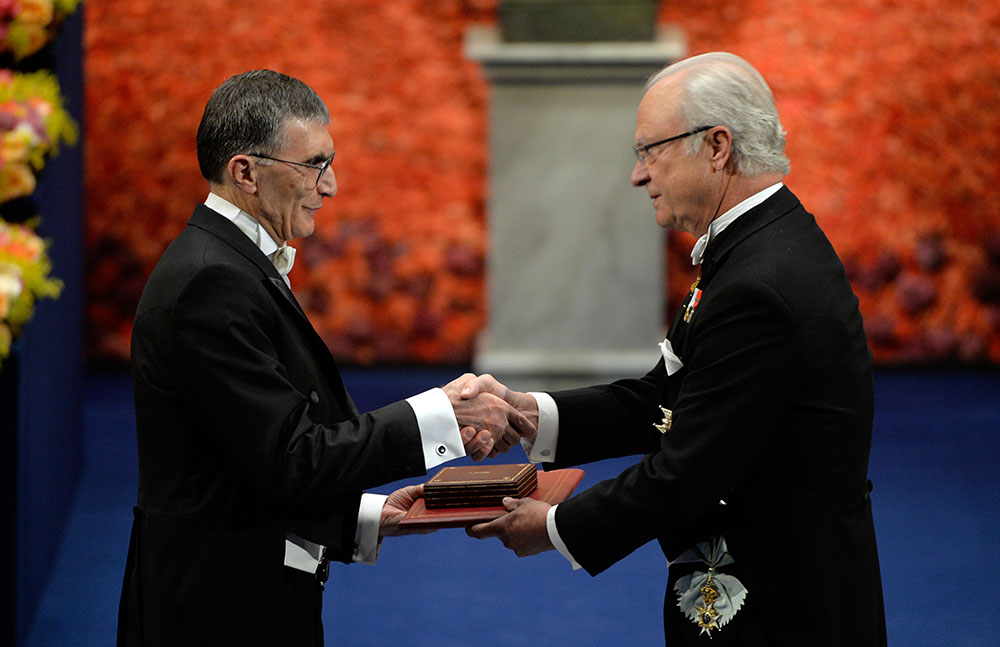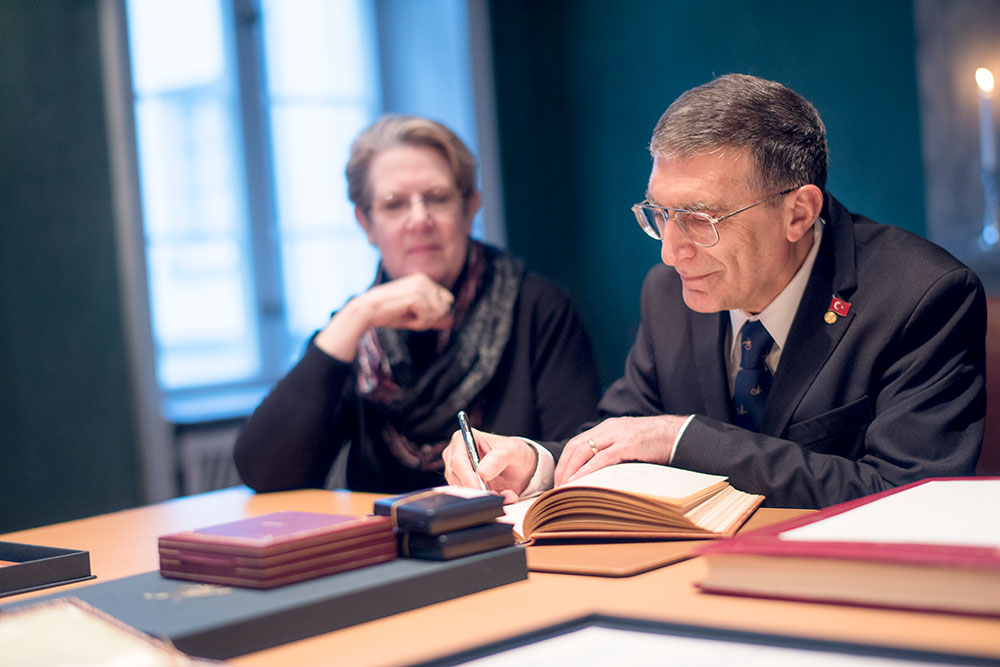
Dr. Aziz Sancar (left), who accepted the Nobel Prize in chemistry from H.M. King Carl XVI Gustaf of Sweden, will receive the UT Dallas Lifetime Achievement Award at the Awards Gala on Saturday, March 24. (Nobel Media AB 2015; Photo: Pi Frisk)
One of the most distinguished graduates of The University of Texas at Dallas will return to campus this week to give a public lecture and receive the institution’s highest honor.
Dr. Aziz Sancar, who earned his PhD in molecular and cell biology from UT Dallas in 1977 and won the 2015 Nobel Prize in chemistry, will receive the University’s inaugural Lifetime Achievement Award during the annual Awards Gala on Saturday, March 24.
He also will present the 2018 Anson L. Clark Memorial Lecture, sponsored by the School of Natural Sciences and Mathematics. The free public talk, titled “Mechanisms of DNA Repair by Photolyase and Excision Nuclease,” will be at 10 a.m. Friday, March 23, in the Edith O’Donnell Arts and Technology Building’s lecture hall.

Sancar, with wife Gwen, also a graduate of UT Dallas, said his time at the University had a big impact on his subsequent achievements and career. (Nobel Media AB 2015; Photo: Alexander Mahmoud)
“Winning a Nobel Prize marks the height of scientific accomplishment,” said Dr. Bruce Novak, dean of the School of Natural Sciences and Mathematics. “We are very proud of Dr. Sancar’s success as a scientist and a mentor, and just as proud of the role UT Dallas played in fostering that success. It’s a true pleasure to welcome him back to campus and provide him an opportunity to share his research experiences at the Clark Lecture.”
After graduating at the top of his medical school class in his native Turkey and serving as a physician there, Sancar came to the U.S. to learn more about the underlying mechanisms of disease, including the field of DNA repair. As a graduate student at UT Dallas, he worked under one of the pioneers in the field, Dr. Claud Stanley Rupert, who died in 2017.
“Dr. Rupert was the founding father of the field of DNA repair,” said Sancar in Rupert’s UT Dallas obituary. “I was fortunate to have him as my mentor not just during my graduate work at UT Dallas but throughout my career. I owe him more than anyone else for my academic successes at UTD and beyond.”
Sancar said in an interview for the UT Dallas Magazine that his time at the University heavily influenced his subsequent research achievements and career.
“It was the foundation of everything I have done since,” he said. “I started on DNA repair at UT Dallas, and I have continued for over 40 years on that path. The University has had a significant impact on my research.”
2018 Anson L. Clark Memorial Lecture
“Mechanisms of DNA Repair by Photolyase and Excision Nuclease”
Speaker: Dr. Aziz Sancar, Sarah Graham Kenan Professor of Biochemistry and Biophysics at the University of North Carolina School of Medicine, and winner of 2015 Nobel Prize in chemistry
When: 10 a.m. Friday, March 23
Where: Edith O’Donnell Arts and Technology Building Lecture Hall
One of three recipients of the 2015 Nobel Prize in chemistry, Sancar earned the award in part for his research that describes the mechanism of nucleotide excision repair, the mechanism that cells use to repair damage to DNA caused by ultraviolet radiation. People born with defects in this repair system will develop skin cancer if they are exposed to sunlight.
As a UT Dallas graduate student, Sancar successfully cloned, purified and characterized a bacterial enzyme called photolyase, and invented the Maxicell method, which he later used to identify, purify and characterize the enzymes for nucleotide excision repair at Yale University and the University of North Carolina at Chapel Hill (UNC). At UNC, he is carrying out research on mapping human DNA repair and the molecular mechanism of the circadian clock.
“Throughout his career, Dr. Sancar has shown an exceptional dedication to the pursuit of transformative knowledge,” said Dr. Kyle Edgington, vice president for development and alumni relations. “His many achievements reshaped the fields of biochemistry and molecular biology, and are a continued source of pride for UT Dallas. As such, we felt it appropriate to introduce a Lifetime Achievement Award to recognize UTD alumni, and are honored to name Dr. Sancar as our inaugural recipient.”
A member of the National Academy of Sciences and the National Academy of Medicine, Sancar received the UT Dallas Distinguished Alumnus Award in 2009. He currently is the Sarah Graham Kenan Professor of Biochemistry and Biophysics at the University of North Carolina School of Medicine.
The Anson L. Clark Memorial Lecture series began in the early 1970s and has drawn distinguished speakers to the UT Dallas campus. The lectures honor the memory of Clark, who amassed a sizable fortune throughout a highly unusual and successful career — first as an engineer, then as a physician at the Mayo Clinic, and finally as a businessman in the oil and banking industries. Clark’s philanthropic activities have for many decades supported scholarly endeavors at a number of Texas colleges and universities, including the Clark Summer Research Program and the Clark Presidential Scholarship at UT Dallas.